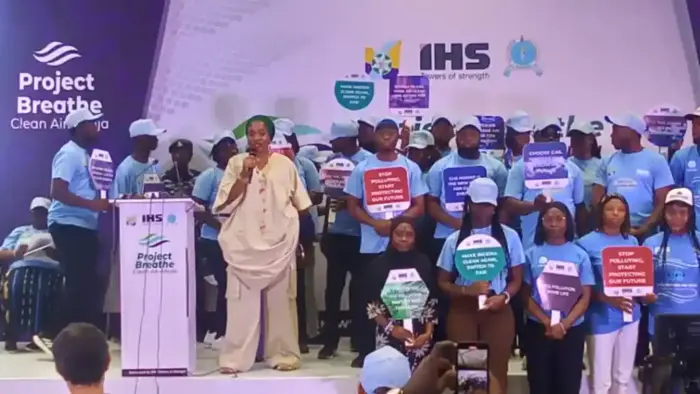The Federal Capital Territory Administration (FCTA) has launched a major public health and environmental campaign aimed at reducing household air pollution and promoting clean cooking across Abuja.
The initiative, titled Breathe Clean Air in Abuja, was unveiled at the Bola Ahmed Tinubu International Conference Centre, drawing government officials, development partners, environmental experts and schoolchildren.
Health and Environment Mandate Secretary, Dr Dolapo Fasawe, described the programme as a crucial step toward safer and healthier homes, noting that millions of Nigerians still cook with firewood and charcoal—exposing families, particularly women and children, to harmful smoke linked to respiratory disease and cancer.
“These deaths are preventable,” she said. “This transition is not about 5,000 cylinders; it is the beginning of a journey every Nigerian must embrace because clean air is a right.”
Co-founder of IHS Towers, Mr Sam Darwish, whose organisation donated 5,000 LPG cylinders for the pilot phase, reaffirmed the firm’s commitment to improving public health and supporting clean energy solutions. “Clean energy access is essential for protecting families and empowering women,” he said.
According to the World Health Organization, household air pollution causes 3.2 million deaths globally each year. In Nigeria, more than 120 million people rely on firewood and charcoal, contributing to respiratory infections, lung cancer and other preventable health complications.
Reflecting on her medical experience, Dr Fasawe emphasised that Nigeria’s Ebola response demonstrated the power of early action and strong public communication—principles guiding the Clean Air campaign.
Cancer prevention specialist, Dr Ramatu Usman, also warned of the rising incidence of lung cancer among women who have never smoked. “They inhaled smoke from kitchens, not cigarettes,” she said, adding that while treatment can cost up to ₦7 million monthly, prevention requires a simple transition to clean cooking fuels.
The initiative received legislative backing after Chairman of the House Ad-hoc Committee on FCT Health, Hon Dr M. A. Oriyan, announced that the programme would be captured in the 2026 national budget.
A poem titled Abuja, Our Hope Will Breathe Again, delivered by schoolgirl Isabella, was one of the event’s highlights and drew a standing ovation.
The Clean Air Initiative also supports wider environmental and developmental priorities, including carbon emission reduction, improved sanitation, recycling, and women’s economic empowerment. Dr Fasawe, a strong advocate of resource recovery, reiterated that “everybody’s waste is somebody’s raw material.”
She, however, stressed that environmental efforts must be regional to be effective. “Environment has no boundaries. If Abuja succeeds but Nasarawa fails, we have not won,” she said.
With government commitment, private sector support and community involvement, officials say the programme positions Abuja as a national model for clean energy transition and could significantly improve public health over time.





